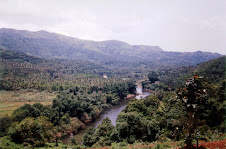Click here to view the powerpoint slideshow.
Mudugar-Kurumbar Research Centre is established with a fund from World Oral Literature Project of University of Cambridge. It is a space of Mudugar and Kurumbar to preserve documents in digital formats. The slideshow gives an idea of the kind of work that is done in the Centre. Justin Raj is at present working in the Centre as intern. He is researching on the occupation of Mudugar.
Monday, 24 May 2010
Thursday, 6 May 2010
Who works at the Research Centre?
From Right to left: Kiran Tom Sajan, Sachindev P.S. and Ramu
The Story of Mudugar
Labels:
Documentary,
Kerala,
Mudugar,
Tribal community
Who owns the documents?
Mudugar and Kurumbar are two tribal communities, who can be traced back to the tradition of Sangam period in Tamil Nadu. The songs that they sing, the stories that they tell and the culture that they practice have similarities with the descriptions of Sangam people. But influences of external cultures could have made drastic changes in their life, culture and literature. So it becomes impossible, now for the community members and researchers, to trace the authorship or creatorship of oral literature and practices. So, the question of ownership is a difficult one to answer. The complexity is that it certainly belongs to the contemporary tribal people and their dead ancestors. So the photographs, videos, dissertations and articles written on the literature and culture of Mudugar and Kurumbar actually belong to the community. The Research Centre was founded to collect and centralise already existing materials and to document memories which are diminishing and fast forgotten. Here is a link from youtube.com which is a trailer of a video-documentary on Mudugar. The documentary is titled The Story of Mudugar.
How and why a Research Centre for Mudugar and Kurumbar?
Office of Mudugar-Kurumbar Research Centre, Attappady
Objectives of the Project:
1. To create a resource centre of digital and print documents for Mudugar and Kurumbar
2. To produce ethnographic video-documentaries on the life of the communities
3. To create a space for the communities to recap their memories
4. To provide guidance for research scholars in the area
5. To bring to light the issues pertaining to the communities
Strategies
Documentation will be done using digital video-camera and still-camera. The documents created will be classified, edited, described and stored. Some documents will be uploaded on the internet and will be provided to research scholars on demand. The documents will be disseminated through workshops and seminars held in local schools and colleges.
Officers
Nirmal Selvamony (President, OSLE-India)
N. Watson Solomon (Media Advisor, OSLE-India)
Rayson K. Alex (Principal Researcher)
Sachindev P.S. (Media Officer)
C. Ramu (Field worker)
Vasantha (Field worker)
Manoj U.A. (Collaborator of the Project)
S. Susan Deborah (Public Relations Officer)
Samuel Moses K.S. (Convener, Ecomedia Team)
About OSLE-India
Organisation for Studies in Literature and Environment-India (OSLE-India) is a forum for promoting ecocriticism, especially in India and also in other Asian countries. Today, 'ecocriticism' has come to mean not only 'the application of ecology and ecological principles to the study of literature,' but also the theoretical approach to the interrelational web of natural, cultural and supernatural phenomena. It is the first ecocriticism forum in India, promoting the cause of this discipline. Due to its persistent motivation, already some academic institutions in India have introduced courses in ecocriticism. This forum continues to bring out an online newsletter and a journal (Indian Journal of Ecocriticism). It has brought out a volume on ecocriticism entitled Essays in Ecocriticism and conducted workshops and international conferences.
About Ecomedia Team
Ecomedia Team is a group functioning within OSLE-India, specialising and researching on the ecological aspects of media like, print, video, film and internet. It conducts workshops, competitions and is currently engaged in the making of an ecological video-documentary.
Subscribe to:
Comments (Atom)



